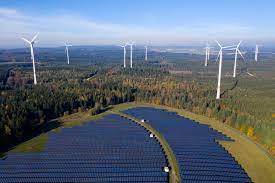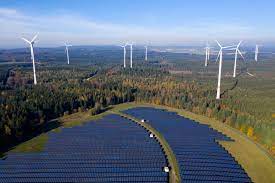
The International Energy Agency is of the opinion that of the world has to meet the climate targets, there has to be a boost up over the next decades in the supply of critical minerals that are considered to be crucial for technologies such as wind turbines and electric vehicles.
The importance of ramping up of supply of nickel, cobalt, lithium, copper and rare earth elements was focused on in a new the report titled “The Role of Critical Minerals in Clean Energy Transitions” that was published by the Paris-based organization.
The extent to which the need for these materials could increase going forward was outlined by the IEA in a statement accompanying the release of the report.
“Demand outlooks and supply vulnerabilities vary widely by mineral,” it said, “but the energy sector’s overall needs for critical minerals could increase by as much as six times by 2040, depending on how rapidly governments act to reduce emissions.”
The IEA noted the potential increase in the pressure on supply of critical minerals because of more installations of renewable energy production units and said that an onshore wind plant needed “nine times more mineral resources than a similarly sized gas-fired power plant.”
Government around the world are setting targets of cutting down on carbon emissions and increasing the role of renewable energy installations and a number of them are also targeting to cut down on use of fossil fuels for energy and replace it with more use of wind and solar energy. However it is also accepted that ground realities show that many such countries will face a huge challenge as it will require a huge amount of change.
There are however some changes taking place - slowly but surely, despite the enormity and challenges of the task. For example, the US Department of Energy announced at the end of April of awarding of $19 million in funding for 13 projects that are related to production of rare earth elements and critical minerals. The projects will be located in what the DOE described as “traditionally fossil fuel-producing communities.” It said that rare earth elements and critical minerals were “vital to the manufacturing of batteries, magnets, and other components important to the clean energy economy.”
There will be a number of hurdles to overcome with demand for these materials only set to increase. A number of potential challenges were highlighted in the IEA report.
The IEA has identified the “complex and sometimes opaque” supply chains of such minerals as well as a small number of countries holding majority rights to such materials. The IEA also noted producers of such materials being subjected to tougher environmental and social standards and a drop in the quality of available deposits.
“Today, the data shows a looming mismatch between the world’s strengthened climate ambitions and the availability of critical minerals that are essential to realising those ambitions,” Fatih Birol, the IEA’s executive director, said in a statement.
“The challenges are not insurmountable, but governments must give clear signals about how they plan to turn their climate pledges into action,” Birol added.
“By acting now and acting together, they can significantly reduce the risks of price volatility and supply disruptions,” he said.
(Source:www.cnbc.com)
The importance of ramping up of supply of nickel, cobalt, lithium, copper and rare earth elements was focused on in a new the report titled “The Role of Critical Minerals in Clean Energy Transitions” that was published by the Paris-based organization.
The extent to which the need for these materials could increase going forward was outlined by the IEA in a statement accompanying the release of the report.
“Demand outlooks and supply vulnerabilities vary widely by mineral,” it said, “but the energy sector’s overall needs for critical minerals could increase by as much as six times by 2040, depending on how rapidly governments act to reduce emissions.”
The IEA noted the potential increase in the pressure on supply of critical minerals because of more installations of renewable energy production units and said that an onshore wind plant needed “nine times more mineral resources than a similarly sized gas-fired power plant.”
Government around the world are setting targets of cutting down on carbon emissions and increasing the role of renewable energy installations and a number of them are also targeting to cut down on use of fossil fuels for energy and replace it with more use of wind and solar energy. However it is also accepted that ground realities show that many such countries will face a huge challenge as it will require a huge amount of change.
There are however some changes taking place - slowly but surely, despite the enormity and challenges of the task. For example, the US Department of Energy announced at the end of April of awarding of $19 million in funding for 13 projects that are related to production of rare earth elements and critical minerals. The projects will be located in what the DOE described as “traditionally fossil fuel-producing communities.” It said that rare earth elements and critical minerals were “vital to the manufacturing of batteries, magnets, and other components important to the clean energy economy.”
There will be a number of hurdles to overcome with demand for these materials only set to increase. A number of potential challenges were highlighted in the IEA report.
The IEA has identified the “complex and sometimes opaque” supply chains of such minerals as well as a small number of countries holding majority rights to such materials. The IEA also noted producers of such materials being subjected to tougher environmental and social standards and a drop in the quality of available deposits.
“Today, the data shows a looming mismatch between the world’s strengthened climate ambitions and the availability of critical minerals that are essential to realising those ambitions,” Fatih Birol, the IEA’s executive director, said in a statement.
“The challenges are not insurmountable, but governments must give clear signals about how they plan to turn their climate pledges into action,” Birol added.
“By acting now and acting together, they can significantly reduce the risks of price volatility and supply disruptions,” he said.
(Source:www.cnbc.com)





